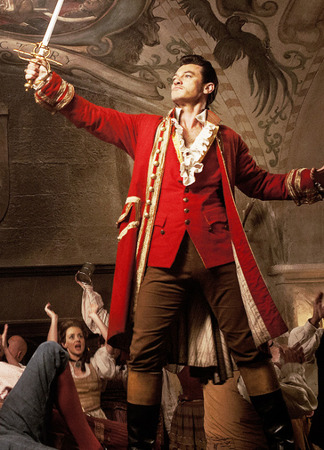As I watched Disney's new Beauty and the Beast with my husband this weekend, I was captivated by Gaston – the narcissistic man who wants to marry the book-loving Belle – in a way that I didn't expect to be.

At multiple points in the movie, Gaston proclaims, “It's hero time!”, a fitting proclamation for someone as arrogant as him. Each time he makes such a proclamation, he takes matters into his own hands, does something foolish, and ushers in disaster.
As I sat watching Gaston do this, I couldn't help but think of youth workers.
Many of us have our own hero complexes. After all, we got into ministry because of our desire to help people. So when we see a needy teen, a hurting parent, or a distraught leader, we think it's our job to save them.
Like Gaston, we do so alone, convinced the only foolish thing to do would be to slow-down long enough to get advice from the simple townspeople, or in our case, the community of faith. So we do things our way, convinced we're exactly what hurting people need.
Then, when God in his mercy takes pity on us and gives us a win, our hero complex only grows. So the next time we see someone in need, we repeat the process, subconsciously rallying ourselves with Gaston's cry, “It's hero time!”
The problems with this are numerous.
First of all, as youth workers, it's not our job to be anyone's hero. The only savior our students – and our congregations need – is Jesus. Whenever we try to be heroic, we create unhealthy relationships between ourselves and those we're trying to save. We insert ourselves into the middle of people's relationships with Jesus, which then makes people dependent on us for their spiritual growth.
Secondly, when we try to be the hero, we build ministries centered on us. Heroes, after all, enjoy the spotlight. That's antithetical to the notion that as youth workers, one of our jobs is to equip the saints for the work of ministry (Ephesians 4:12). How can we equip others for ministry if we want all the attention, recognition, and glory?
Thirdly, heroes become heroes because they depend on themselves. While individualism may be an American value, it's not a Christian one. In fact, it counters what is a decidedly Christian value: community. As church leaders, we need to depend on our community – for the gifts they bring to the body of Christ and for their advice. As Proverbs 15:22 warns, “Plans fail for lack of counsel, but with many advisers they succeed.”
Lastly, attempts to be heroic often end in disaster. Just ask Gaston. Near the end of Beauty and the Beast, the villagers storm the castle in an attempt to kill the beast. Things go fairly well for the villagers until Gaston decides to go after the beast himself, stopping on the castle steps to proclaim, “It's hero time!” Before you know it, the battle's momentum shifts and the villagers find themselves fleeing the castle in terror. Meanwhile, Gaston is left to battle the beast alone, eventually (spoiler alert!) falling to his death. In the same way, our attempts to be heroic also have a tendency to usher in disaster. A desire to be the hero clouds our judgment, preventing us from seeing what people in our ministry REALLY need and getting them the help that we cannot (or should not) provide. Because heroic aspirations result in ministries centered on us, those ministries also tend to be fleeting, often collapsing when we leave.
While heroes may be the stars of movies, they shouldn't be the stars of youth ministries.
So the next time you find yourself starting to think, “It's hero time!”, reach for your community and together, point teens towards Jesus – the only one who really can save people.
Tags
Latest Posts
- Honey, I love you
- 12 Books You Should Read
- A blessing for youth leaders nurturing faith beyond youth group
- 8 ways to help mission teams conclude more than “poor people are happy”
- The fantasy youth ministry candidate
- What students need most when they’re stuck spiritually
- The tearing of the curtain
- How do you not hate them?
- Messy Ashes
- What it means to be a Bradbury